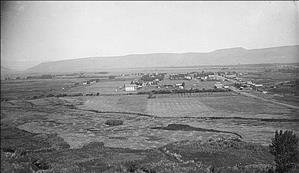On September 25, 1916, 46 members of the Industrial Workers of the World (IWW) are arrested in North Yakima in the midst of a large street meeting intended to persuade apple pickers to ask for a better wage. Most of these Wobblies (the nickname for members of the IWW) are themselves migrant farm workers. As police, led by Chief B. F. McCurdy, begin arresting speakers standing on a soapbox, new speakers mount the soapbox, continuing to address the crowd. The Wobblies fail to disperse, sing protest songs, and loudly express disapproval of the Yakima police.
One Big Union
The IWW was an "industrial" union -- one that embraced and organized both skilled and unskilled workers into the same union. Industrial unions contrasted with "craft" unions that organized only skilled workers, with workers of each type of skill represented by a different union, so that within one factory there might be six different unions representing six different types of skilled labor, while the unskilled workers would not be unionized. Under industrial unionism all the workers in that one factory would be organized into one union. The IWW was formed in 1905 partly in opposition to the craft unionism of the American Federation of Labor (AFL). It was a democratic union with a mix of radical anti-capitalist politics.
By 1916 Wobblies in the Northwest were making noticeable inroads into logging and agriculture. At the same time, Eastern Washington, with its orchards, hops, and wheat, was becoming increasingly dependent on seasonal labor.
Lice Not Nice
In North Yakima (later renamed Yakima), the arrested Wobblies were taken to the decrepit Yakima City Jail, which was crawling with lice. The incarcerated men held a meeting to discuss these gross conditions. They voted to condemn the jail, and proceeded to demolish it from the inside out. As they did so they sang rousing songs such as "Solidarity Forever," and "Tramp, Tramp, Tramp." The police and the fire department then turned a fire hose on them.
The next morning 200 businessmen met at the Commercial Club, armed themselves with pick and ax handles, and marched in a body to the city jail. The vigilante mob herded the men, who were still soaking wet, out of jail and to the train depot. At the depot they forced them into two refrigerated (ice) cars and ordered the train crew to remove them from town. The train crew refused. The crowd then marched the men back to the jail.
Exchanging Views
At this point, Mayor Jay Lynch went to speak to the incarcerated men. C. W. Ryan spoke for the jailed Wobblies. Ryan assured Mayor Lynch that their intention was not to destroy the crops (as had been alleged), since that was their source of employment.
The impasse began to be solved. The following day IWW organizer Richard Brazier of Spokane arrived in the city to force the issue of organizing rights. A conference was held among city officials, labor union representatives, and two IWW members. The outcome was that the IWW was allowed to organize.
Historian Greg Hall suggests that it was a representative of the State Labor Council, Edward Maurer, whose voice was decisive. It was Maurer's view that if the IWW were prevented from organizing, then other unions would face the same prohibition.
Police had closed the IWW hall, but now it reopened. Organizing among agricultural laborers continued in the Yakima valley, with a fair amount of success, though the union never obtained control of area industry.
Local citizens developed tolerance for the IWW. The Yakima Morning Herald even published the menu for the Thanksgiving Day feast to be served at the union hall. The repast included Direct Action Duck, Chicken a la Sabotage, Rebel Cranberries, and Liber-Tea.

